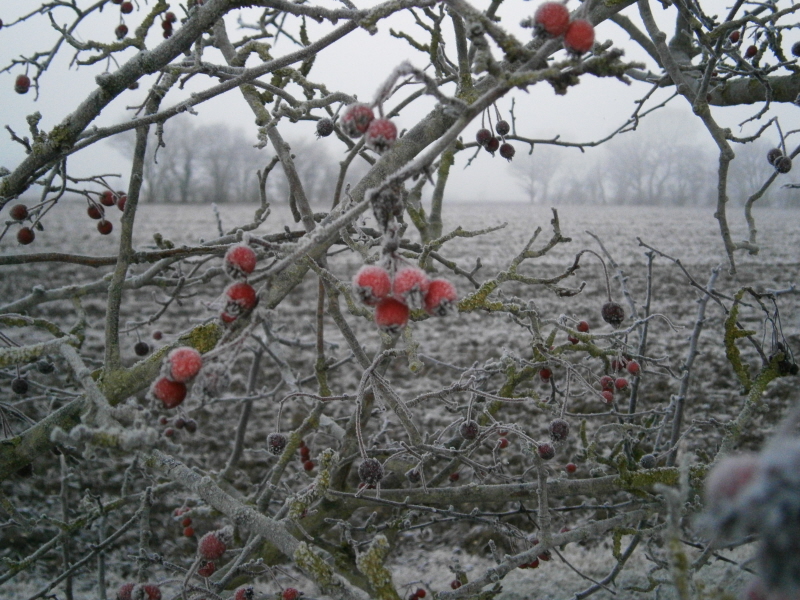
28 Dec Thoughts from the Frost
This morning the fields were gripped by a hard frost as we walked out at 7.30 hoping for a sunrise.
Crows were already up and blackbirds rustled through the ditch edges. The dog searches out clues of the night’s activities: the muntjac picking its way across the lane, the fox pushing through bramble, feathers from a goldfinch felled for the sparrowhawk’s supper.
The monochrome start of the day is a time of awakenings. We flush pigeons from their roost and fieldfares startle from tree to tree. But today, as dawn comes, the fog creeps out, thickening and threading through the lane, brushing the dead umbels of cow parsley and spangling the rose hips. By sunrise the fog has obscured the horizon and the lemon light faded into a grey dawn.
It is a strange time at this turning point of the year. Despite passing the solstice, sunrise stubbornly stays at 8.05 until 6th January when it is just one minute earlier. We make the most of the light – beginning our morning walk before dawn and often returning from an afternoon walk as twilight builds. Bright blue skies and the white light of frost can lift the spirits despite the cold.
The weather may not only affect our mood but also our imagination. Peter Ackroyd in his examination of English cultural history[1] notes the dominance of cold and rain in literature. “In the writing of the Anglo-Saxons it is always winter; it is cold there….Winter, and darkness, were the prevailing conditions in a land of frost and snow falling.” He notes that subsequent literature is dominated by rain, mist and melancholy.
This is a theme developed last year by Alexandra Harris in her book exploring weather and its effects on English literature.[2] From the Anglo-Saxon winterworld to the frost fairs of London during Dickens’ childhood, it seems that cold weather colours our writing.
We return from our walk through a curtain of mist that snags and freezes onto the trees lining the lane. It may be cold, but there is breakfast and a log fire waiting, and the morning’s frost has sparked some thoughts about writing and our response to the weather. It reminds me of childhood winters, which seemed longer and colder than now.
[1] Albion: The Origins of the English Imagination, Chatto & Windus, 2002
[2] Weatherland: Writers and Artists under English Skies Thames & Hudson 2015


